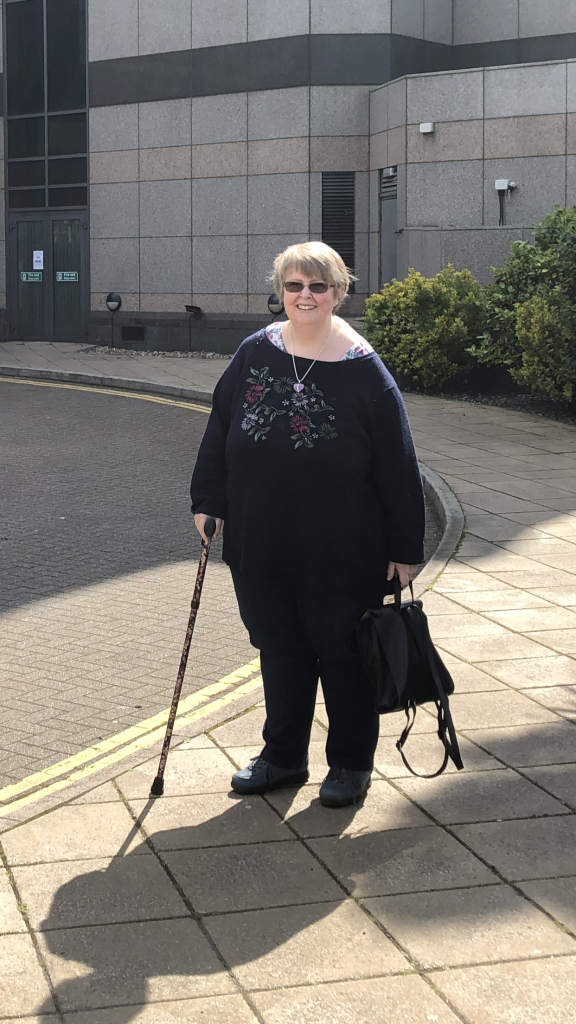
The picture above is of Doris and me, about to go on a cruise in 2019. It was a couple of months after I was seriously ill, and Steve and I were quite nervous about going; but it had been planned quite a while, and was the honeymoon we had anticipated for 27 years. Doris had to come too.
Doris is my trusty walking stick. She doesn’t get out much these days; but today she came to Sissinghurst Gardens. I had a busy day yesterday, talking to someone about the events that resulted in me sustaining a brain injury so today I am muddly, can’t walk well, and am struggling to understand what people are saying or form proper sentences when I am talking. For some obscure and fortunate reason it is easier to write this than to communicate with other people on days like this.
Normally I am really good at hiding it. Or at least I think I am. If I am careful and pace myself carefully I can keep the symptoms at bay. I am an expert on pacing. I know that if I sleep for nine hours including a rest in the afternoon, and don’t try to socialise with friends for more than two hours in a row, and don’t try and write more than 1000 words at a time, I can cope.
When I get it wrong Doris comes out of the cupboard or the car boot and gets to go on adventures. It is a positive thing giving a walking aid a name. It might sound slightly alarming to other people if I suddenly say, ‘Oh, I forgot Doris. Shall we go and get her?’ It makes it sound as if I have left a slightly dotty aunt in the car park during hot weather, but I’d rather ask Steve, ’Shall we bring Doris?’ than ’Is my walking bad enough to need a walking stick today?’ Because both questions mean exactly the same thing and Steve knows that.
My novel This Place of Happiness was written before my brain injury. I don’t know if I will ever write anything of the same standard again. When I first came out of hospital I couldn’t read, I couldn’t write properly – my handwriting didn’t look the same for quite a while – I couldn’t watch a TV programme in one go, and had to watch it in small ten minute chunks. My coordination was awful, and I quite often saw things moving that weren’t moving, or things that weren’t there. Particularly on my right hand side.
One of the things I find most interesting is confabulation. That means that when my brain doesn’t understand what it can see or hear it fills in the gaps for me. It is very thorough in the way it does this. It does it when I am reading, so it means that if I tried to read medical notes it would quite happily replace words that make no sense with something based on my imagination and previous experiences. It’s one of the main reasons I can no longer work as a midwife. There would be no way to know if what I read is real or not.
There are days when I don’t recognise what coins might be worth. (Easily solved with contactless payments thankfully.) My cooking is more of a disaster than it was before I was ill, and that means that it is really exceptionally awful. I am not exaggerating when I tell you that the cats run out of the house when I approach the oven, because they hate the sound of the smoke alarm. Even before being ill my husband and son used to hide the saucepans on top of the kitchen cupboards in the hope that I wouldn’t go near them.
I go for walks, and I go swimming and to aquafit classes to help my balance and improve my walking. I make an effort to spend time with friends because the randomness of conversation helps my dysphasia, or difficulty expressing myself. I try.
The main thing I do though is write every day. I do this for practical reasons. I find it hard to make new memories, so I write down everything important that happens. I make notes at hospital appointments (or someone makes them for me – thanks Jo!), and I write down every important conversation I have afterwards. It is time consuming, but it is good for me, and when I have forgotten what happened yesterday I have a record if I thought it was important at the time.
The most important thing I do though is to write stories. I can still write stories. My imagination kicks in, and my characters come to life. I make mistakes I wouldn’t have made three years ago. I use the same names in everything I write, and when I have finished I have to choose new names. My niece helps me spot my mistakes (thank you again, Jo), and I have list after list that help me keep a track of details of plot and character. I reread from the beginning of the story to make sure I am grounded in what is happening. It is painstaking work in a way that it never was before. The end result isn’t the same but writing still makes me feel like I’m flying and that anything is possible. I can worry about the mistakes later.